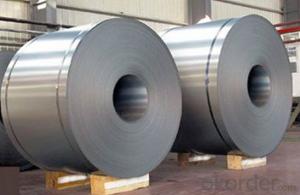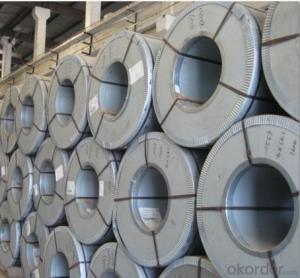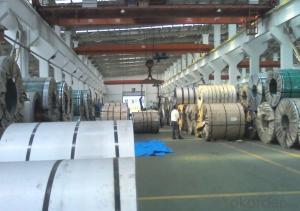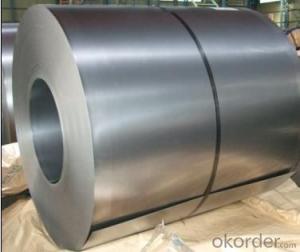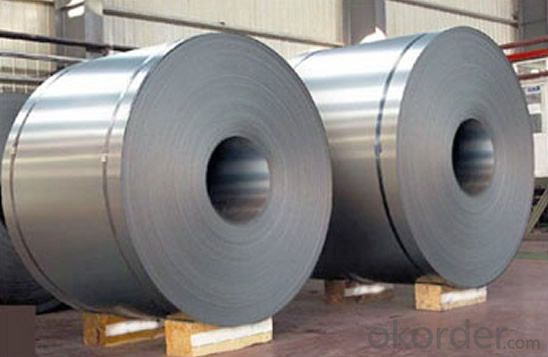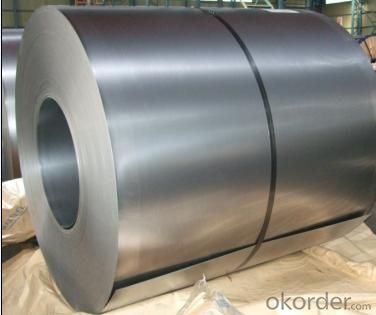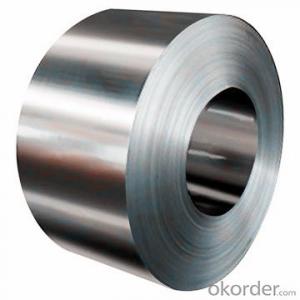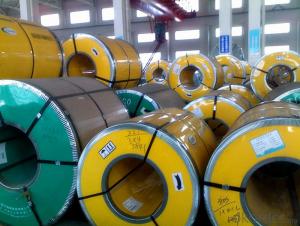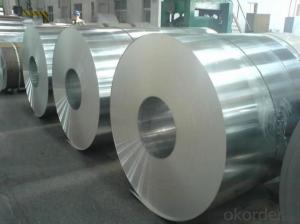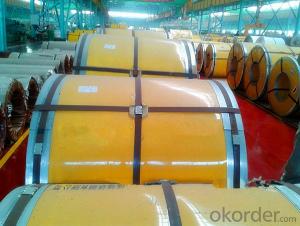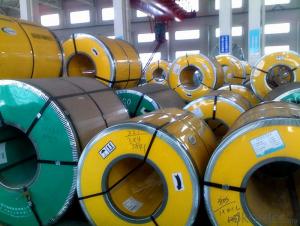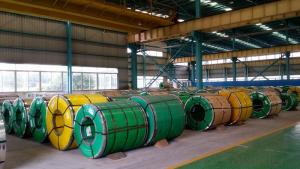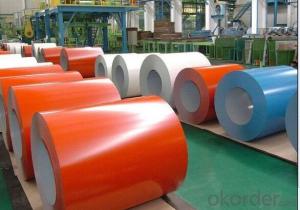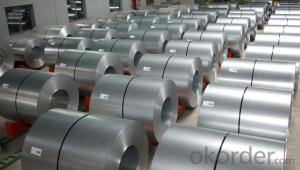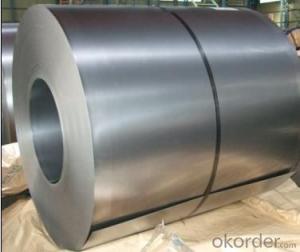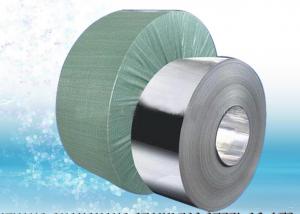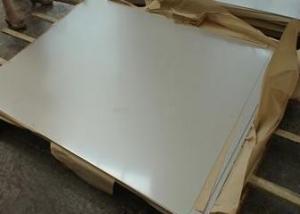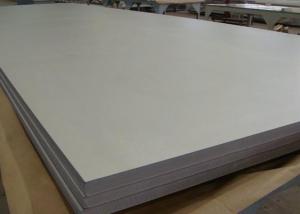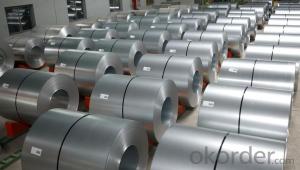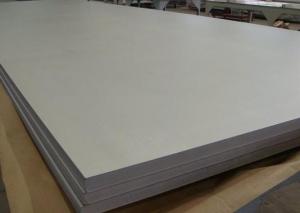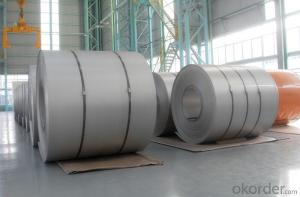Stainless Steel Coil 304 Hot/Cold Rolled 2B/NO.1
- Loading Port:
- Guangzhou
- Payment Terms:
- TT OR LC
- Min Order Qty:
- 100 m.t.
- Supply Capability:
- 20000 m.t./month
OKorder Service Pledge
OKorder Financial Service
You Might Also Like
Hot Rolled Stainless Steel Coil 304 Annealing and Pickling No.1 Finish
Stainless steel is a production which not easy rust,acid resistance and corrosion resistance,so it is widely
used in light industry,heavy industry,daily necessities and the decoration industry.
Hot Rolled Stainless Steel Coil 304 Specifications
1.surface:NO.1
2.standard:JIS, AISI, GB
3.width: 0.55m, 0.65m, 1.0m, 1.22m, 1.5m, 2m or requirement
Hot Rolled Stainless Steel Coil 304 Chemical Composition:
(%):C=0.07, Mn=2.00, P=0.045, S=0.030, Si=0.075, Cr=17.5-19.5, Ni=8.0-10.5, N=0.10
Hot Rolled Stainless Steel Coil 304 Physical Properties
Tensile strength σb (MPa) ≥ 520
the conditions yield strength σ0.2 (MPa) ≥ 205,
elongation δ5 (%) ≥ 40
Reduction of ψ (%) ≥ 50,
hardness: ≤ 187
HB; ≤ 90
HRB; ≤ 200H
- Q: Can stainless steel strips be used in chemical processing?
- Yes, stainless steel strips can be used in chemical processing. Stainless steel is corrosion-resistant, making it suitable for handling chemicals and maintaining the purity of the process. It also offers high strength and durability, making it a reliable material choice for various chemical processing applications.
- Q: What are the common length tolerances for stainless steel strips?
- The common length tolerances for stainless steel strips can vary depending on the specific industry and application requirements. However, in general, the length tolerances for stainless steel strips typically range from +/- 0.005 inches to +/- 0.030 inches. These tolerances ensure that the stainless steel strips are cut and measured within the specified dimensions, allowing for a precise fit and optimal performance in various applications. It is essential to consult the specific industry standards and customer specifications to determine the exact length tolerances required for stainless steel strips in a particular application.
- Q: What are the common uses of stainless steel strips in the construction industry?
- Stainless steel strips are widely used in the construction industry for various purposes. One common use of stainless steel strips is in the fabrication of structural components such as beams, columns, and braces. These strips provide excellent strength and durability, making them ideal for supporting heavy loads and ensuring the structural integrity of buildings. Another common use of stainless steel strips in construction is for cladding and decorative purposes. Stainless steel strips can be used to cover exterior walls, roofs, and facades, providing a sleek and modern aesthetic to the building. The corrosion-resistant properties of stainless steel make it an excellent choice for such applications, as it can withstand harsh weather conditions and maintain its appearance over time. Stainless steel strips are also used in the construction of handrails, balustrades, and guardrails. These components are essential for safety purposes, and stainless steel's high strength and corrosion resistance make it a reliable material for such applications. Additionally, stainless steel strips can be easily shaped and formed, allowing for the creation of intricate and visually appealing designs. Furthermore, stainless steel strips find application in the construction of infrastructure projects such as bridges and tunnels. These structures require materials that can withstand heavy loads, extreme temperatures, and exposure to moisture. Stainless steel strips possess these qualities, making them a popular choice for the construction of durable and long-lasting infrastructure. In summary, stainless steel strips have numerous common uses in the construction industry. They are used for structural components, cladding, decorative purposes, handrails, balustrades, guardrails, and infrastructure projects. The versatility, strength, and corrosion resistance of stainless steel make it an ideal material for these applications, ensuring the longevity and quality of construction projects.
- Q: Can stainless steel strips be used in electronic applications?
- Stainless steel strips are indeed applicable for electronic purposes. Their exceptional corrosion resistance and mechanical properties render them suitable for a range of electronic components and devices. Connectors, terminals, springs, shields, and enclosures often utilize stainless steel due to its common usage. In electronic circuits, stainless steel strips guarantee dependable performance through their high strength and durability. Moreover, their non-magnetic properties make them an excellent fit for applications that demand minimal disruption to magnetic fields. All in all, stainless steel strips present numerous benefits for electronic use, which explains their popularity in the industry.
- Q: Can stainless steel strips be used in extreme temperature conditions?
- Stainless steel strips are capable of being used in extreme temperature conditions. This material is versatile and durable, able to endure a wide range of temperatures. Its exceptional heat resistance properties make it suitable for both high and low-temperature environments. Stainless steel strips maintain their structural integrity and mechanical properties even under intense heat. They also exhibit remarkable resistance to thermal expansion and contraction, ensuring stability in extreme temperature conditions. Moreover, stainless steel has excellent resistance to corrosion, oxidation, and scaling, making it an excellent choice for applications that involve temperature fluctuations and exposure to harsh environments. In conclusion, stainless steel strips are a dependable and efficient option for various industries that require materials capable of withstanding extreme temperatures.
- Q: How does the thermal conductivity of 111 stainless steel strips compare to other materials?
- The thermal conductivity of 111 stainless steel strips is generally lower compared to other materials. Stainless steel is a poor conductor of heat compared to metals such as copper or aluminum. However, within the stainless steel family, the 111 grade can have a slightly higher thermal conductivity than other stainless steel grades. Despite this, it is still lower compared to many other commonly used materials. For applications requiring high thermal conductivity, other materials with better thermal conductivity properties, such as copper or aluminum, would be more suitable.
- Q: What are the common dimensions of stainless steel strips?
- The common dimensions of stainless steel strips can vary depending on the specific application and industry. However, there are some standard dimensions that are commonly available. Stainless steel strips are typically available in widths ranging from 0.5 inches to 24 inches (1.27 cm to 60.96 cm) and thicknesses ranging from 0.005 inches to 0.25 inches (0.0127 cm to 0.635 cm). Lengths can vary depending on the supplier and the customer's requirements, but standard lengths are often around 12 feet (3.66 meters) or 20 feet (6.1 meters). It is important to note that these dimensions are not exhaustive and can vary depending on the specific needs of the project or industry.
- Q: How do you prevent rusting of stainless steel strips?
- To prevent rusting of stainless steel strips, it is important to keep them clean and dry. Regularly cleaning with mild soap and water, followed by thorough drying, helps remove any contaminants and moisture that can promote rust formation. Additionally, applying a thin coat of mineral oil or a specialized stainless steel cleaner can provide a protective barrier against rust.
- Q: Do stainless steel strips require any special handling or storage?
- Yes, stainless steel strips do require special handling and storage to maintain their quality and prevent damage. Here are some key considerations: 1. Handling: Stainless steel strips should be handled with care to avoid scratches, dents, or other forms of physical damage. It is recommended to use gloves and protective equipment to prevent any contamination from oils, dirt, or fingerprints. 2. Storage: Stainless steel strips should be stored in a clean, dry, and well-ventilated area to prevent corrosion. They should be kept away from moisture, chemicals, and any other substances that could cause damage. Ideally, the storage location should have a controlled temperature and humidity level. 3. Protection: To ensure the longevity of stainless steel strips, they should be protected from contact with other metals or abrasive materials. Storing them separately or using appropriate packaging, such as plastic or paper interleaved between the strips, can help prevent scratches or other damages. 4. Handling equipment: When moving or transporting stainless steel strips, it is advisable to use equipment specifically designed for handling metal products. This can include lifting devices, slings, or clamps that ensure proper support and avoid any bending or deformation of the strips. 5. Regular inspection: Regularly inspecting stainless steel strips for any signs of damage, corrosion, or deterioration is essential. Any issues should be addressed promptly to prevent further degradation and maintain the quality of the strips. By following these guidelines, stainless steel strips can be stored and handled properly, ensuring their integrity and allowing for their successful application in various industries.
- Q: Can stainless steel strips be used for cladding purposes?
- Indeed, cladding purposes can make use of stainless steel strips. Renowned for their durability, resistance to corrosion, and aesthetic charm, stainless steel is a favored option for cladding applications. On numerous surfaces like walls, columns, and facades, stainless steel strips can be effortlessly installed to furnish both a safeguarding and decorative overlay. Be it commercial, industrial, or residential projects, stainless steel strips provide a flexible and enduring resolution for cladding purposes.
Send your message to us
Stainless Steel Coil 304 Hot/Cold Rolled 2B/NO.1
- Loading Port:
- Guangzhou
- Payment Terms:
- TT OR LC
- Min Order Qty:
- 100 m.t.
- Supply Capability:
- 20000 m.t./month
OKorder Service Pledge
OKorder Financial Service
Similar products
Hot products
Hot Searches
Related keywords
